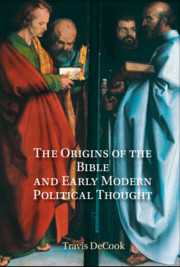 The Origins of the Bible and Early Modern Political Thought
The Origins of the Bible and Early Modern Political Thought Spinoza’s Reimagining of the Bible’s Origins and the Interiorization of Religion
Published online by Cambridge University Press: 02 March 2021
This chapter considers how Spinoza’s treatment of scriptural origins in the Theological-Political Treatise is used to found his political argument. It argues that concepts of secularity and secularization have been inaccurately applied to Spinoza’s discussion of the Bible’s textual history, and that Spinoza cannot be viewed simply as a debunker of Scripture, even as his treatment of Scripture is theologically radical and has profound political implications. It shows how his claim that the Bible’s origins lie in the human imagination undergirds his argument that religious belief can be separated from religious conduct, a distinction not only central to his argument for the political state’s control over religion, but also central to the secular states associated with modernity. The chapter proceeds to show the oppressive and illiberal implications of Spinoza’s political-theological argument for religious minorities. Spinoza’s non-traditional account of the Bible and religion thus both founds a distinction which proved fundamental to modern secularity, even as, it is argued, Spinoza’s theological-political argument itself resists a straightforward identification as secular.
To save this book to your Kindle, first ensure [email protected] is added to your Approved Personal Document E-mail List under your Personal Document Settings on the Manage Your Content and Devices page of your Amazon account. Then enter the ‘name’ part of your Kindle email address below. Find out more about saving to your Kindle.
Note you can select to save to either the @free.kindle.com or @kindle.com variations. ‘@free.kindle.com’ emails are free but can only be saved to your device when it is connected to wi-fi. ‘@kindle.com’ emails can be delivered even when you are not connected to wi-fi, but note that service fees apply.
Find out more about the Kindle Personal Document Service.
To save content items to your account, please confirm that you agree to abide by our usage policies. If this is the first time you use this feature, you will be asked to authorise Cambridge Core to connect with your account. Find out more about saving content to Dropbox.
To save content items to your account, please confirm that you agree to abide by our usage policies. If this is the first time you use this feature, you will be asked to authorise Cambridge Core to connect with your account. Find out more about saving content to Google Drive.